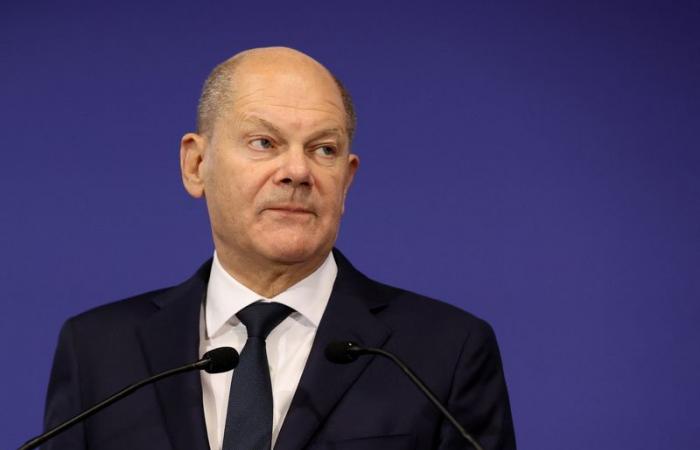The collapse of the German government could have a positive effect on the struggling Eurozone economy. Indeed, increased spending could support the currency and stock markets, although the path forward remains uncertain.
Markets are already pricing in an increase in government borrowing that would help stimulate the economy, which has helped the closely watched bond market gauge of debt issuance reach a record high.
One of the reasons for the collapse of the ruling coalition was disagreement over whether to suspend Germany's debt brake, which limits borrowing, and early indications from markets are that new elections in February could bring more certainty to an economy that narrowly avoided recession.
German stocks outperformed their European peers on news of the government collapse last Wednesday, another sign of a more positive mood taking hold – just hours after Donald Trump's victory in the US election made pose the threat of tariffs, a new blow for Europe's largest economy.
“German growth momentum has been anemic and much of this has been self-inflicted as Germany has clung to the debt brake at a time when the economy needs support,” Guy said Miller, chief market strategist at Zurich Insurance Group.
“The collapse of the coalition is constructive and we hope there will be greater fiscal space in the 2025 budget.
DEBT BRAKE DILEMMA
Economists have long criticized the debt brake, adopted in 2009, for holding back the German economy, which is expected to contract this year.
An increase in government spending from 1% to 2% of output over 10 years could boost potential growth to at least 1%, from around 0.5% currently, estimates Carsten Brzeski, head of global macroeconomics at ING.
“Germany does not face a public finance problem,” Brzeski said, because with debt representing only 63% of output, it has more room to spend than other countries. like France and Italy.
“If you can combine reforms with looser tax policies, do it,” he added.
The International Monetary Fund also said Germany should consider easing its debt brake and any signs of increased spending could support European stocks.
The pan-European STOXX 600 index is up just 6% this year, less than a quarter of the 26% gain in the U.S. S&P 500 index.
The hope of a policy change in favor of growth “would be necessary for the valuations of German stocks to recover”, estimates Barclays.
Citi expects tax cuts proposed by the conservative opposition Christian Democrats, leading in polls, to support the actions.
The euro, which fell to its lowest level since April around 1.06 dollars on Tuesday, and whose concerns about customs tariffs raise the possibility of a drop in the parity, could also benefit.
Kit Juckes, Société Générale's chief foreign exchange strategist, notes that Germany overtook Japan this year as the country with the most foreign assets, meaning it has plenty of capital that could be used to invest in its own economy.
That money “could be used to buy high-yield German government bonds to boost the economy,” Juckes said, adding that it could eventually have a “significant impact” on the euro if the government signals a significant change in its political approach.
The hope is that a policy shift on Germany's part could also open the door to more joint European spending. Mr Trump's election could force the Union, which already faces calls for massive investments to boost competitiveness, to increase its defense spending.
“A change of tone at the German summit is essential to progress towards greater European integration,” said Gilles Guibout, head of European equity strategies at AXA Investment Managers.
He called the dismissal of Finance Minister Christian Lindner, a fiscal hawk, “good news” for Europe, but added that it remained to be seen whether it would be enough.
HOLD FAST !
Certainly, political uncertainty means additional short-term difficulties for the industry and could damage confidence.
The conservatives, expected to lead the next government, could limit the increase in spending. Their leader, Friedrich Merz, wants to stick to the debt brake.
To discuss reforms, he wants the conditions to be met to invest in programs favorable to growth, but also to control social spending. He also opposed any new common European Union debt.
Economists debate whether the debt brake itself could be subject to reform or whether Germany could launch new off-budget spending, difficult issues that require a large majority in parliament.
Goldman Sachs predicts that conservatives will only support changing the debt brake for modest additional spending, on the order of 0.5% of output, expecting fiscal policy to remain a “brake” to growth.
Thierry Wizman, strategist at Macquarie, recommends betting against the euro without the guarantee of a reforming government.
For others, change is a matter of time.
Davide Oneglia of consultancy TS Lombard expects the snap elections to bring debates over Germany's growth model and EU security risks “to the forefront in all their urgency “.
“The main risk, in our opinion, is that they do not understand the need for a paradigm shift and that they fall back on old economic recipes, which are now unviable,” he said. “The German economy and that of the European Union would then face even greater difficulties.






